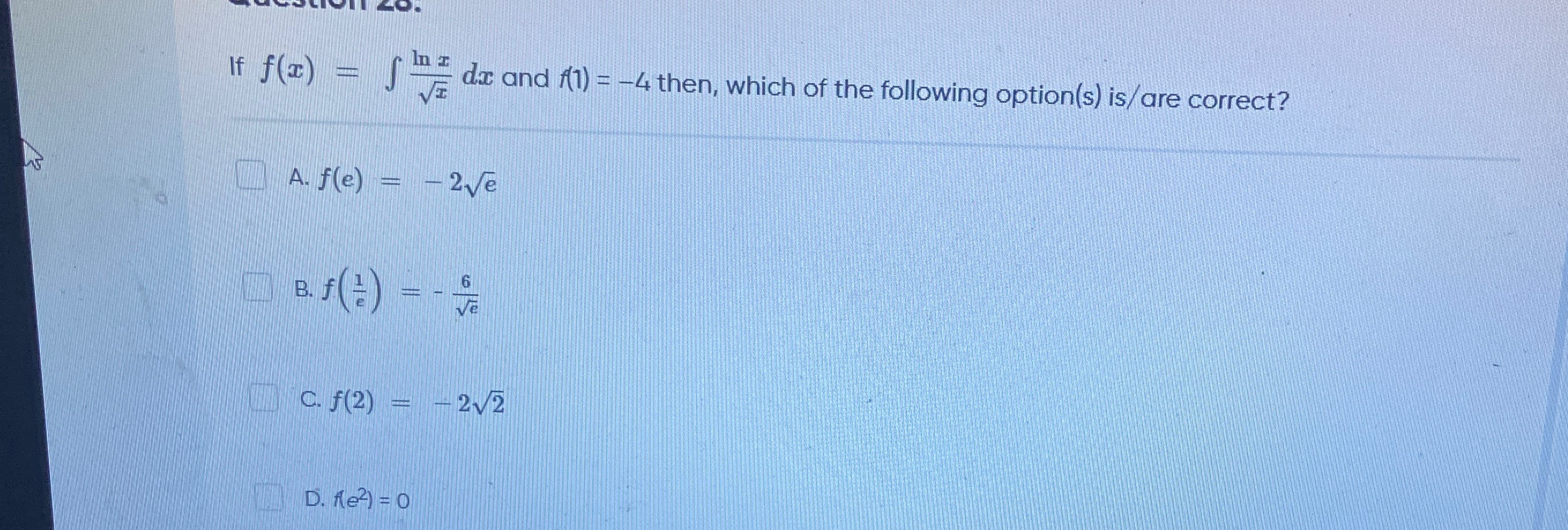Question
Question: If $f(x) = \int \frac{ln x}{\sqrt{x}} dx$ and $f(1) = -4$ then, which of the following option(s) is/...
If f(x)=∫xlnxdx and f(1)=−4 then, which of the following option(s) is/are correct?

f(e)=−2e
f(e1)=−e6
f(2)=−22
f(e2)=0
A, B, D
Solution
To solve this problem, we need to find the function f(x) by integrating xlnx and use the given condition f(1)=−4 to determine the constant of integration.
1. Integrate f(x)=∫xlnxdx
We use integration by parts, which states ∫udv=uv−∫vdu.
Let u=lnx and dv=x1dx=x−1/2dx.
Then, we find du and v:
du=x1dx
v=∫x−1/2dx=−1/2+1x−1/2+1=1/2x1/2=2x.
Now, apply the integration by parts formula:
f(x)=(lnx)(2x)−∫(2x)(x1)dx
f(x)=2xlnx−∫2x1/2x−1dx
f(x)=2xlnx−∫2x−1/2dx
f(x)=2xlnx−2(1/2x1/2)+C
f(x)=2xlnx−4x+C
2. Use the condition f(1)=−4 to find C
Substitute x=1 into the expression for f(x):
f(1)=21ln1−41+C
Since ln1=0 and 1=1:
f(1)=2(1)(0)−4(1)+C
f(1)=0−4+C
f(1)=−4+C
Given f(1)=−4:
−4=−4+C
C=0
So, the function is f(x)=2xlnx−4x, which can be factored as f(x)=2x(lnx−2).
3. Check the given options
A. f(e)=−2e
Substitute x=e into f(x):
f(e)=2e(lne−2)
Since lne=1:
f(e)=2e(1−2)
f(e)=2e(−1)
f(e)=−2e
Option A is correct.
B. f(e1)=−e6
Substitute x=e1 into f(x):
f(e1)=2e1(lne1−2)
f(e1)=e2(lne−1−2)
Since lne−1=−1lne=−1:
f(e1)=e2(−1−2)
f(e1)=e2(−3)
f(e1)=−e6
Option B is correct.
C. f(2)=−22
Substitute x=2 into f(x):
f(2)=22(ln2−2)
For this to be equal to −22, we would need ln2−2=−1, which implies ln2=1. This means 2=e, which is false (since e≈2.718).
Therefore, Option C is incorrect.
D. f(e2)=0
Substitute x=e2 into f(x):
f(e2)=2e2(lne2−2)
f(e2)=2e(2lne−2)
Since lne=1:
f(e2)=2e(2(1)−2)
f(e2)=2e(2−2)
f(e2)=2e(0)
f(e2)=0
Option D is correct.
The correct options are A, B, and D.
